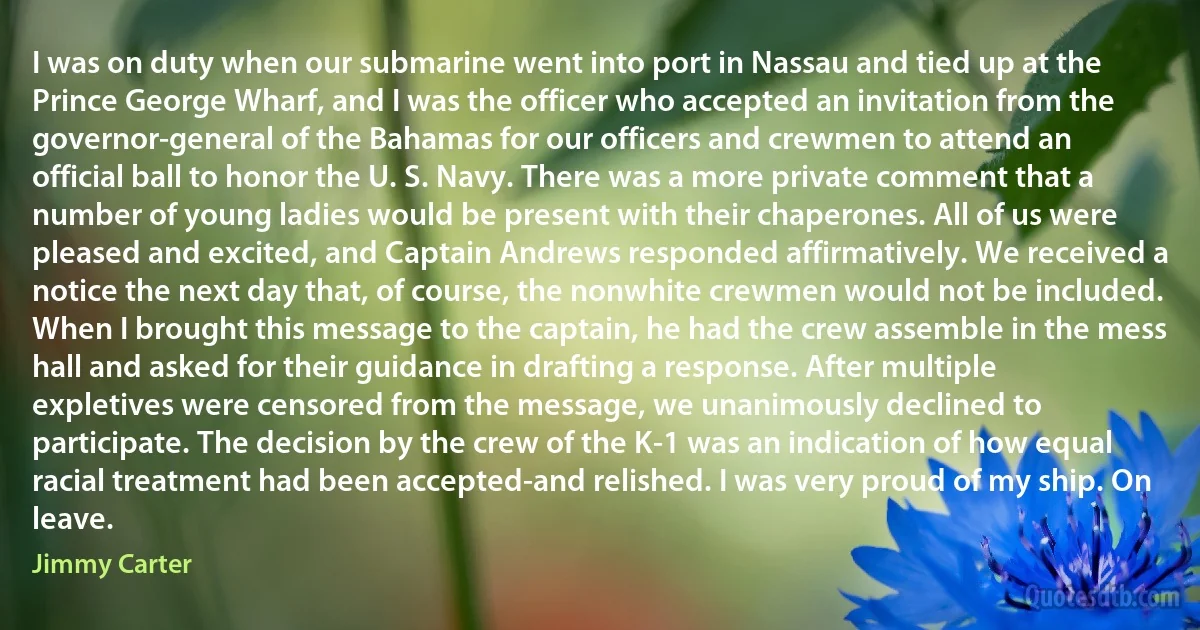
I was on duty when our submarine went into port in Nassau and tied up at the Prince George Wharf, and I was the officer who accepted an invitation from the governor-general of the Bahamas for our officers and crewmen to attend an official ball to honor the U. S. Navy. There was a more private comment that a number of young ladies would be present with their chaperones. All of us were pleased and excited, and Captain Andrews responded affirmatively. We received a notice the next day that, of course, the nonwhite crewmen would not be included. When I brought this message to the captain, he had the crew assemble in the mess hall and asked for their guidance in drafting a response. After multiple expletives were censored from the message, we unanimously declined to participate. The decision by the crew of the K-1 was an indication of how equal racial treatment had been accepted-and relished. I was very proud of my ship. On leave.
Jimmy CarterRelated topics
ball course crew day drafting duty equal went hall honor leave navy next notice number port present prince racial ship submarine wharf young bahamas andrewsRelated quotes
A composer's awareness of the plurality of functions of his own tools forms the basis for his responsibility just as, in everyday life, every man's responsibility begins with the recognition of the multiplicity of human races, conditions, needs, and ideals. I would go as far as to say (as my anger comes back) that any attempt to codify musical reality into a kind of imitation grammar (I refer mainly to the efforts associated with the Twelve-Tone System) is a brand of fetishism which shares with Fascism and racism the tendency to reduce live processes to immobile, labeled objects, the tendency to deal with formalities rather than substance. Claude Lévi-Strauss describes (though to illustrate a different point) a captain at sea, his ship reduced to a frail raft without sails, who, by enforcing a meticulous protocol on his crew, is able to distract them from nostalgia for a safe harbor and from the desire for a destination.

Luciano Berio
It is by no means enough that an officer of the Navy should be a capable mariner. He must be that, of course, but also a great deal more. He should be as well a gentleman of liberal education, refined manners, punctilious courtesy, and the nicest sense of personal honor.
He should be the soul of tact, patience, justice, firmness, kindness, and charity. No meritorious act of a subordinate should escape his attention or be left to pass without its reward, even if the reward is only a word of approval. Conversely, he should not be blind to a single fault in any subordinate, though at the same time, he should be quick and unfailing to distinguish error from malice, thoughtlessness from incompetency, and well meant shortcomings from heedless or stupid blunder.
In one word, every commander should keep constantly before him the great truth, that to be well obeyed, he must be perfectly esteemed.

John Paul Jones
The Filipino, it seems, has lost his soul, his dignity, and his courage. We have come upon a phase of our history when ideals are only a veneer for greed and power, (in public and private affairs) when devotion to duty and dedication to a public trust are to be weighted at all times against private advantages and personal gain, and when loyalties can be traded...Our government is in the iron grip of venality, its treasury is barren, its resources are wasted, its civil service is slothful and indifferent, its armed forces demoralized and its councils sterile. We are in crisis. You know that the government treasury is empty. Only by severe self-denial will there be hope for recovery within the next year...This nation can be great again. This I have said over and over. It is my articles of faith, and Divine Providence has willed that you and I can now translate this faith into deeds.

Ferdinand Marcos
Our military force at this moment is as efficient in discipline as it is in numbers; and this not only in the regular army, but in the militia, volunteers, and other descriptions of force. We have six hundred thousand men in arms, besides a navy of two hundred thousand. The masculine energies of the nation were never more conspicuous, and the country never at any period of its history stood in so proud and glorious a position, as at present. After a conflict for fifteen years, against an enemy whose power had been progressively increasing, we are still able to maintain the war with augmenting force and a population, by the pressure of external circumstances, consolidated into an impregnable military mass. Our physical strength has risen when it has been called for; and if we do not present the opposition of numerous fortresses to an invader as the continent does, we present the more insuperable barrier of a high-spirited, patriotic, and enthusiastic people.

Henry Temple, 3rd Viscount Palmerston
Here is my proposal. Israel should announce an immediate unilateral cessation in retaliation against terrorist attacks. This moratorium would be in effect for a short period, say four or five days, to give the Palestinian leadership an opportunity to respond to the new policy. It would also make it clear to the world that Israel is taking an important step in ending what has become a cycle of violence. Following the end of the moratorium, Israel would institute the following new policy if Palestinian terrorism were to resume. It will announce precisely what it will do in response to the next act of terrorism. For example, it could announce the first act of terrorism following the moratorium will result in the destruction of a small village which has been used as a base for terrorist operations. The residents would be given 24 hours to leave, and then troops will come in and bulldoze all of the buildings.

Alan Dershowitz
